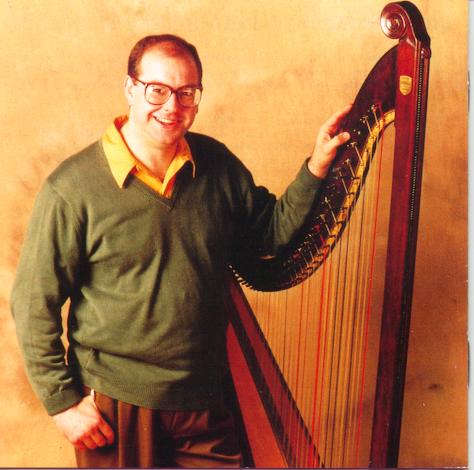
Robin Huw Bowen- Telynor Moreiah

Robin Huw Bowen
Arfryn
Moreiah
Capel Seion
Aberystwyth
Ceredigion
![]()
![]()
![]()
UK
Tel (+44) 01970 611109
|
Robin Huw Bowen is the foremost and only fully professional player of the uniquely Welsh triple harp, as well as a campaigner for its revival and all things Welsh (well, almost all things). As the only harpist in the world today devoting himself solely to the performance of the Welsh triple harp, Robin Huw Bowen is currently the leading exponent of this historical, triple-strung wonder of the folk harp world. Reminiscent of the carefree, Welsh gypsy harpists of the last century, Robin's infectious arrangements delight in taking the triple harp out of the parlor & into the public house for a bit of fun. Always sensitive, always vibrant, his touch is the breath of life for forgotten Welsh melodies, well-worn favorites, or contemporary compositions, including some of his own. Of North Walian stock & raised in a Welsh quarter of Liverpool, Robin now resides in Aberystwyth, which he fondly refers to as "The Centre of the Known Universe." WALES alone, of all the Celtic nations, can claim an unbroken harp tradition. From the lyre-like harp of the Romano-Celtic period to the towering pedal harp of modern times, the harp has been one constant in Welsh music and culture. It is the harp, therefore, which has received the honor to be called The National Instrument of Wales. The triple harp originated in Europe, coming possibly from Italy in the late seventeenth/early eighteenth century. It was popular for a time throughout Europe, in art music as much as folk, but, during the mid nineteenth century was superseded by the pedal harp (which uses the pedal for accidentals). The Triple Harp has three rows of strings, the outer two in unision to each other, the middle for accidentals, making it a fully chromatic instrument. The triple harp survived in Wales, where it was extremely popular, and became known as the Welsh national instrument in the nineteenth century and is commonly referred to now as the Welsh harp. It is associated with the great Welsh harpists such as John Parry in the eighteenth century, John Roberts in the nineteenth century, and, of course, Nansi Richards (Telynores Maldwyn) in the twentieth century. Born in Liverpool (the unofficial 'capital of North Wales', despite being in England), to Welsh-speaking parents, Robin learned simple celtic harp while at school, inspired by the Breton harper, Alan Stivell. He was first exposed to the triple harp by the brothers Dafydd and Gwyndaf Roberts who played the instrument with the traditional Welsh group Ar Log. They had learned from Nansi Richards, and he in turn learned from them. He played locally for serveral years, and joined the Welsh traditional group Mabsant in 1986, toured and recorded with them for two years and then set out on his own. Since then he has played solo and with the vocal duo Cusan Tan, with whom he currently tours. In a linked strand, he worked for some years at the Welsh National library. While there he discovered several old collections of Welsh tunes and arrangements for harp. He set up his own press, Gwasg Teires (Triple Harp Press) to publish this material, one of the only current sources for traditional Welsh music; his book of two hundred hornpipes, Tro Llaw, mostly from this archives was published by the Welsh National Library. Robin is also heavily involved in Welsh folk dancing, as most of the Welsh folk tunes are dance tunes, ranging from the slow gracious dance like "Meillionen o Feirionydd" to the faster, lively fair dances of "Rali Twm Sion". Robin has been a member of Parti Dawns Aelwyd Aberystwyth for nearly 20 years and was leader of the group for two years until he turned professional harpist in 1988. He is still Chairman of the group and has been instrumental with Dr Ian Hughes in researching and perfecting the Llangadfan Dances from the 18th century manuscript.
|
Tudarlennau'r We wedi'u paratoi gan / Web Pages
designed by -
Dafydd Thomas, Aberystwyth - [email protected]